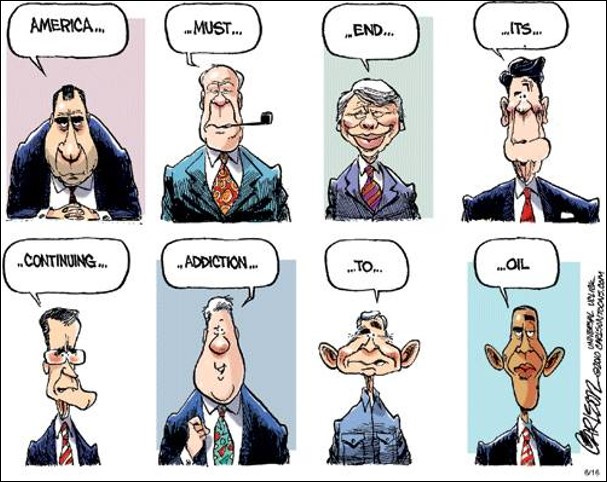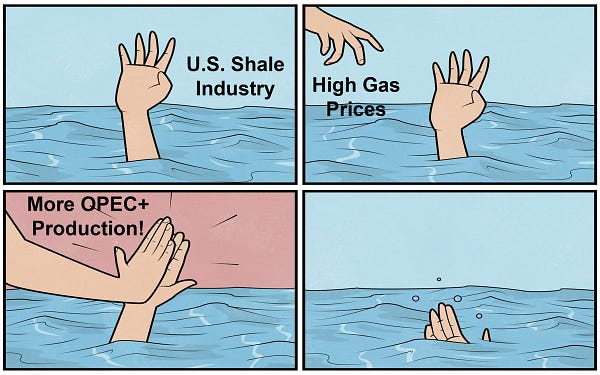I find the intersection between energy and politics fascinating.
In large part because there’s often a stark contrast between optimistic government policy objectives and the realities of our current energy system.
Amidst the ongoing energy transition, the conflict between optimism and reality is becoming increasingly clear. There’s growing friction between different policy objectives which, in some cases, are in direct conflict with one another.
A few examples of those conflicting priorities:
Climate Change Leadership: Setting a global example on emissions reduction. This is increasingly important to younger, Democratic voters.
Energy Security: Maintaining reliable access to energy supply. This includes oil, which in the U.S. is largely produced in Republican states.
Economic Prosperity: Facilitating economic growth and improved national living standards. That’s obviously popular across the political spectrum.
.
Last week, in a White House press statement on U.S. energy policy, the conflicting priorities of President Joe Biden were laid bare.
The White House Made a Statement 🏛️
The statement in question, which was attributed to U.S. National Security advisor Jake Sullivan, made clear that the Biden Administration is growing increasingly concerned with rising energy prices.
Biden’s Administration called out the risk that higher oil prices could negatively impact the global economic recovery. That much was uncontroversial.
What did, however, raise eyebrows was to whom the statement was addressed.

It’s worth reinforcing the press release’s implications.
Let’s lay it out:
Biden is worried that rising energy prices could be problematic
To solve that problem, Biden wants to increase the global oil supply
But he’s wary about boosting U.S. oil production
So instead, he reached out to OPEC+
.
It’s interesting to me that Biden’s administration found it more palatable to ask for help from the oil cartel, whose two lead members are authoritarian regimes (Saudi Arabia and Russia), instead of leaning on domestic oil producers.
That seems a bit ass-backwards. No?
I’d appreciate your help in growing our distribution! 🙂
If you’re enjoying the Plug, please consider sharing it with a friend or coworker.
How To Piss Off Everyone 🤬
It’s been a tough few years for the American oil patch.
From 2011 through mid-2014, the price of U.S. oil hovered between $80 and $110 per barrel. By early 2016, it had fallen to sub-$30.
The global collapse in oil prices created a multi-year challenge for American oil producers. And for many of those companies, profitability rests on the higher oil prices which Biden is trying to avoid.
So yeah, U.S. oil companies were understandably pissed.
Republican politicians and right-wing media jumped on the opportunity to criticize President Biden for both the press release and his energy policy more broadly.
Which I guess should no longer come as a surprise…
Even more entertaining was the backlash Biden faced from progressives.
There’s an obvious contradiction between Biden’s stance on American climate change leadership, and his request to increase global oil production. For progressives who are focused primarily on climate change and emission reductions, should it really matter whether oil is produced domestically or internationally?
It seems to me that President Biden is suffering from a severe case of cognitive dissonance.
Who Cares if Gas Prices Go Up? ⛽
Well actually, pretty much everyone cares.
Across North America, the cost of gasoline (a bi-product of oil) is very possibly the most visible expense that consumers face. And, because of price volatility and inelastic demand, gas prices are a timeless source of consumer frustration.
More broadly, rising oil prices also risk derailing the resurgence in American economic activity of which Biden is so proud.
Politicians are obviously privy to this reality.
Back in 2008, the Democratic Presidential nominee took advantage of high gas prices to hammer the Republicans on energy policy.
Now that the shoe is on the other foot, it shouldn’t come as a surprise that Republicans are flipping the script. And hammering home that same point.
In late June, Republican Chairwoman Ronna McDaniel tweeted:
“Rising [gas] prices under Biden are a hidden tax paid by every American!”
Touché Ronna.
But Gas Prices Aren’t That High…Yet 📈
It’s true that U.S. energy prices have risen substantially this year.
Since January 2021, the global oil benchmark (Brent crude) has risen by ~35%. Gasoline prices have followed suit, and as of Monday the price of gasoline in the U.S. was at ~$3.30/Gallon.
This isn’t actually too far off the $3.50/Gallon that Obama called out in his 2008 political attack ad.
It’s also worth taking inflation into account.
On a real basis (inflation-adjusted), the current price of gasoline in the U.S. is still far North of the 100-year average at ~$2.86/gallon.

There’s no reason that energy prices won’t continue to march higher in the months and years to come. Which the Democrats are currently trying to get ahead of.
Unfortunately for Biden, the near-term solution to rising energy prices is simply more oil production. But a call to U.S. oil producers to “drill baby, drill” may undermine Biden’s credibility as he works to reassert American leadership on climate change.
So instead, he reached out to OPEC+.
The Politics of Gasoline Prices 🏏
While the 2024 U.S. election is still over three years away, the circus of U.S. politics is a battle of attrition. You can bet that Republicans will continue to use gas prices as a cudgel going forward.
This begs the question, can we blame Biden’s Administration for high gas prices?
As Daniel Yergin said in 2012:
"In the short term, there's not very much that any president can do about high gasoline prices, because these are really reflecting what's happening in the world market."
This saga ended on Monday with an anti-climatic “no, thank you” from OPEC+.
But for politicians globally, the conflicting priorities of climate change leadership, energy security, and economic prosperity will remain a challenge for the foreseeable future.
Only time will tell if Biden is successful in his efforts to wean the U.S. off oil. Or if he will eventually become just another former U.S. President on the list below.







